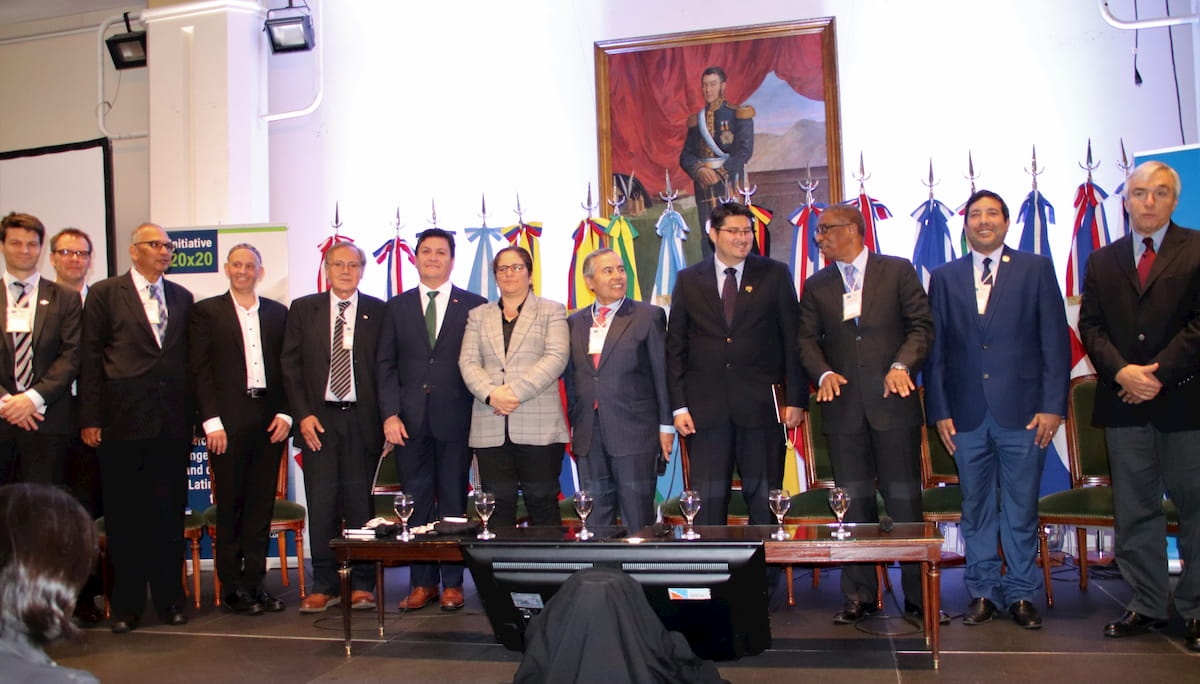BUENOS AIRES, ARGENTINA. June 18, 2019 — Countries in Latin America and the Caribbean reinforced today their commitment to restore degraded landscapes that are key for sustained economic growth, with less carbon emissions and better agriculture productivity. This is why — through Initiative 20x20 — 17 countries will work to align policies and investment aimed at restoring land by 2050 at a level that could help the region achieve carbon neutrality. This level has been estimated by the United Nations Environment Program to be about 250 million hectares.
“If Latin American and Caribbean countries can move closer to carbon neutrality, while offering sustainable products to help satisfy the rapidly-growing global demand for food and timber, this commitment could be a significant contribution to our planet’s health,” said Walter Vergara, coordinator of Initiative 20x20. “This goal is ambitious, but it can be achieved through the smart use of technology, innovation and science, while aligning policies and making the right investments for our landscapes.”
Fourteen ministers and vice-ministers of Latin American and Caribbean countries, representatives of 12 impact funds, and 100 technical experts are meeting in Buenos Aires at the Initiative 20x20 Annual Partners Meeting this week.
“Argentina is committed to supporting regional and global efforts to halt greenhouse gas emissions. Land restoration is a cost-effective option to recover and maintain the ecological, economic, social and cultural functions of a landscape through sustainable systems,” said Sergio Bergman, Environmental Governance and Sustainable Development Secretary for Argentina. “For a country and region like ours — a leading world food supplier — this is vital not only to obtain better crops, but for cleaner water, fertile soils, improved livelihoods, and less risk from extreme climate.”
Initiative 20x20 was launched in 2014 at COP20 in Lima to change the dynamic of land degradation in the region and bring 20 million hectares into restoration by 2020. Already partners of the initiative have launched 104 projects and programs on 14 million hectares across Latin America and the Caribbean (almost the size of France, Germany and Sweden combined) and committed an estimated $1 billion of the $2.4 billion of investment earmarked by financial partners.
Relevant milestones announced this year include:
- Over 500,000 hectares being restored by Conservacion Patagonica and other partners in Argentina and Chile, to encourage sustainability and expand wildlands, as in the Chacabuco Valley in Chile and the Ibera Wetlands in Argentina.
- With support from the Andes Amazon Fund, more than 6 million hectares of land being conserved in the Andean Amazon (almost the size of France) including Sierra del Divisor in Peru and Chiribiquete in Colombia.
- An initiative launched by Colombia to create a 9.2-million-hectare restoration corridor (slightly larger than the size of Germany and Spain combined) in the border area with Brazil and Ecuador to halt degradation of the Amazon.
- A program to substitute African Palm Oils in Brazil, led by Kaete Investmentos and Althelia Funds/INOCAS with support from IDB Invest, with the potential of displacing African Palm Oil — a key deforestation driver in Brazil.
- The reforestation of 1 million hectares through a program led by Mexico’s National Forest Commission (CONAFOR), which adds to Mexico's nearly 7.5-million-hectare commitment to the Bonn Challenge for land restoration.
- A portfolio of 10 projects in six countries by 12Tree focused on agroforestry, with a robust environmental and safeguard protocol, solid monitoring metrics, and a commitment of up to $400 million.
- The creation of FOBOSQUE, a fund to protect forests, and the launch of a National Restoration Plan in Argentina, with more than 40 projects in six forest regions.
- A National Restoration Program being developed by Chile — host of this year’s COP25 — and similar efforts ongoing at different stages in Argentina, Colombia, El Salvador, Guatemala, Uruguay, and other countries.
- Various sustainable agroforestry initiatives to produce coffee, citrus, coconut, and cocoa that could benefit thousands of rural communities.
Extreme weather events and landscape degradation affect thousands of rural and small urban communities in Latin America and the Caribbean whose livelihoods depend on healthy land. Recent months have been particularly costly both economically and in terms of human health as fires exacerbated by prolonged droughts have devastated forests, air quality, water sources and biodiversity.
According to data from a recent report by Global Forest Watch, tree cover loss in Latin America and the Caribbean is estimated to have reached approximately 5,107,864 hectares in 2018. Restoration efforts can help to change this pattern. Restoring degraded land helps recover and maintain the functionality of landscapes through sustainable systems that include combining crops of agroforestry, silvopasture, and land use, while promoting natural or assisted reforestation, forests and other landscapes conservation, and avoiding deforestation. All these elements are crucial for a comprehensive restoration process and will help increase the land’s productivity without causing damage. To learn more, visit: initiative20x20.org.
About Initiative 20x20
Initiative 20x20 is a country-led effort to change the dynamics of land degradation in Latin America and the Caribbean. Governments, regional programs, impact investors, and technical partners launched Initiative 20x20 in 2014 at COP 20 in Lima, to contribute to restoring 20 million hectares of degraded land by 2020. Now that the goal has been reached and US$2.4 billion has been earmarked to finance projects on the ground, partners are working for the region to achieve carbon neutrality by 2050 using restoration as a key approach to benefit economies, people and landscapes.
